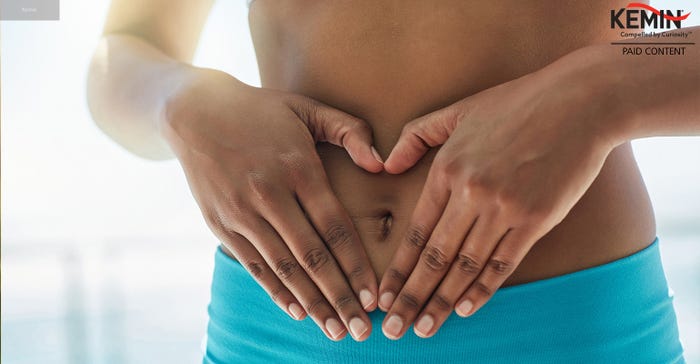Choline's Role in Sports Nutrition: A Matter of Mind Over Muscle
The essential nutrient choline is not only proving to be a popular inclusion in prenatal vitamins, but is also making an appearance in the sports nutrition market.

Choline has been in the news recently, after the American Medical Association (AMA) passed a resolution at its 2017 annual meeting supporting the inclusion of choline in all prenatal vitamins to make sure pregnant women maintain adequate levels. A wealth of scientific studies point to lifelong cognitive benefits from getting and maintaining adequate choline levels during pregnancy and infancy.1,2 These benefits, when coupled with recent research showing that most adults (including 92 percent of pregnant women) don’t get enough choline,3 helped lead the AMA to this important position. Research into the benefits of choline for brain health, liver function and cellular integrity is continuing to make news. What some may have missed, however, is the relevant application in the sports nutrition market.
Choline is classified as an essential nutrient because, while the body can produce it, the quantities are not sufficient to meet the body’s needs. In 1998, the Institute of Medicine (IOM) established a Dietary Reference Intake (DRI) of 550 mg of choline for adults.4 Unfortunately, most people’s choline intake levels are far below the recommended levels as confirmed by data from the most recent National Health and Nutrition Examination Survey (NHANES). People must get more choline than they currently do through diet or other forms of supplementation to meet the body’s needs and take advantage of its benefits.
It wasn’t until recently that the sports nutrition category began to break away from the traditional “hardcore athlete” orientation and move more into the mainstream. According to data from the 2017 Supplement Business Report from the Nutrition Business Journal, sports nutrition has regularly outpaced the total supplement category growth from 2 to 5 points since 2010. As the category has grown, the line between sports nutrition and functional food products with sports benefits has become less clear. Despite this fact, growth is expected to continue to increase, and the category is projected to be more than US$8 billion in sales by 2021. Products that can offer multiple benefits and deliver on both the physical and mental aspects of performance will be well-positioned to capitalize on that growth.
Choline intake is important to physically active individuals who deplete their levels by engaging in sustained intensive exercise. Without enough choline, the body will begin to break down cells to ensure choline supply to the brain. Over time, this can lead to a detrimental buildup of fat in both liver5 and muscle cells.6
Choline’s ability to move fats out of the liver for conversion to energy is unique. By transporting fats out of the liver for conversion to energy, choline provides fuel for the body and helps the B vitamins generate energy.7,8 It complements carnitine’s role in fat metabolism and manages homocysteine to aid in maintaining uninhibited energy production.
Choline also plays a critical role in both synthesis and optimization of nitric oxide (NO), a vasodilator that helps maximize the flow of oxygen and nutrients to the muscles. As research has identified NO’s beneficial and desirable role in the body during strenuous activity,9,10 it has become a prominent ingredient in sports nutrition formulations over the last few years. Since NO vanishes quickly from the body, it needs to be replenished. Choline’s role in helping to eliminate homocysteine, which would otherwise eliminate NO, makes the benefit of using NO and choline together obvious. Specifically, here’s how the process works: Choline is metabolized to betaine, which then converts homocysteine (pro-oxidant) to methionine (beneficial amino acid). Since homocysteine is detrimental to NO production, that helps optimize NO levels, thus improving the flow of blood and nutrients to the muscles. Replenishing choline before and after workouts helps to maintain the body’s stores, which ensures good muscle communication.
Then there is the direct brain benefit: Free choline is needed for the body to make acetylcholine,11,12 the brain’s “instant messenger.” As the primary neurotransmitter, acetylcholine helps transmit messages in the brain and at the neuromuscular junction, essentially sending messages to the muscles more quickly. It also optimizes fine motor coordination to help enhance muscle memory. Maintaining choline levels in the brain helps both with performance and in accurate responses and coordination.
Another desirable sports nutrition benefit is in enhancing accuracy and focus. A 2015 clinical study published in Scientific Reports, a journal published by Nature, found choline plays an important role in focus and accuracy.13 Adults who performed “click and aim” tasks on a computer after ingesting choline bitartrate supplements could make the appropriate adjustments to optimize the balance between accuracy and speed for overall improved performance.
The incentive to supplement with choline is clear for sports nutrition: Most people don’t get enough to begin with, which can lead to fat build up and muscle damage. Choline helps the body maintain higher levels of NO, helps maintain focus and fuels energy.
Until recently, it was thought people got enough choline from diet, so it wasn’t much talked about. Over the last few years, awareness that most people do not get enough of this essential nutrient, coupled with research into its significant benefits, has set the stage for the quickly growing buzz about choline.
This essential nutrient is being discovered by consumers, which creates an extraordinary opportunity for supplement brands. Formulators of sports nutrition products have already figured this out, with multiple new protein beverage mixes featuring choline introduced in this year alone. We expect to see this market grow significantly in coming months.
Tom Druke is director of VitaCholine brand development, Balchem Human Nutrition and Pharma.
References
Zeisel SH. “Choline: needed for normal development of memory.” J Am Coll Nutr. 2000;19(5):528S-31S.
Poly C et al. “The relation of dietary choline to cognitive performance and white-matter hyperintensity in the Framingham Offspring Cohort.” Am J Clin Nutr. 2011 Dec;94(6):1584-91.
Wallace TC, Fulgoni VL III. “Usual choline intakes are associated with egg and protein food consumption in the United States.” Nutrients. 2017;9; 839
“Dietary Reference Intakes for Thiamin, Riboflavin, Niacin, Vitamin B6, Folate, Vitamin B12, Pantothenic Acid, Biotin, and Choline 1998.” DOI: 10.17226/6015.
Fischer L et al. “Sex and menopausal status influence human dietary requirements for the nutrient choline.” Am J Clin Nutr. 2007;85(5):1275-1285.
da Costa K et al. “Elevated serum creatine phosphokinase in choline-deficient humans: mechanistic studies in C2C12 mouse myoblasts.” Am J Clin Nutr. 2004 Jul;80(1):163-70.
Corbin KD, Zeisel SH. “Choline Metabolism Provides Novel Insights into Non-alcoholic Fatty Liver Disease and its Progression.” Curr Opin Gastroenterol. 2012 Mar; 28(2):159–165.
Lokk J. “Association of vitamin B12, folate, homocysteine and cognition in the elderly.” Scand J Nutr. 2003;47:132-138.
Quyyumi A et al. “Contribution of Nitric Oxide to Metabolic Coronary Vasodilation in the Human Heart.” Circulation. 1995;92:320-326
Maiorana A et al. “Exercise and the nitric oxide vasodilator system.” Sports Med. 2003;33(14):1013-35.
Zeisel SH, Corbin KD. “Choline. In: Erdman JW, Macdonald IA, Zeisel SH, eds. Present Knowledge in Nutrition.” 10th ed. Washington, DC: Wiley-Blackwell; 2012:405-18.
Institute of Medicine. Food and Nutrition Board. “Dietary Reference Intakes: Thiamin, Riboflavin, Niacin, Vitamin B6, Folate, Vitamin B12, Pantothenic Acid, Biotin, and Choline.” Washington, DC: National Academy Press; 1998.
Naber M, Hommel B, Colzato L. “Improved human visuomotor performance and pupil constriction after choline supplementation in a placebo-controlled double-blind study.” Sci Rep. 2015 Aug 14;5:13188. DOI: 10.1038/srep13188.
About the Author
You May Also Like





